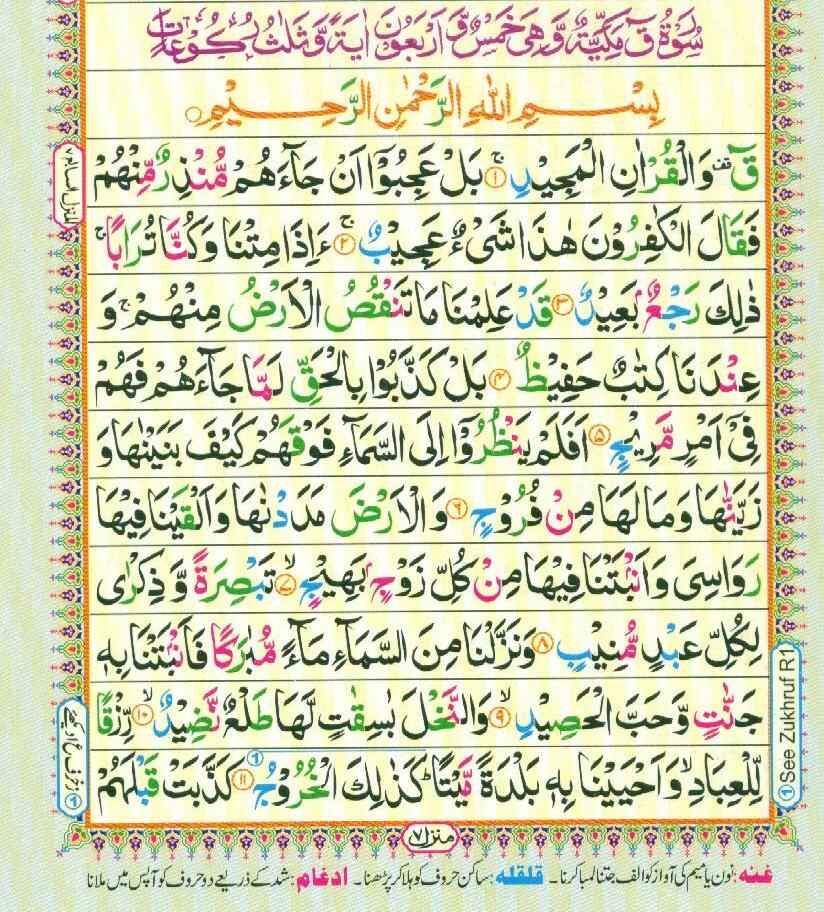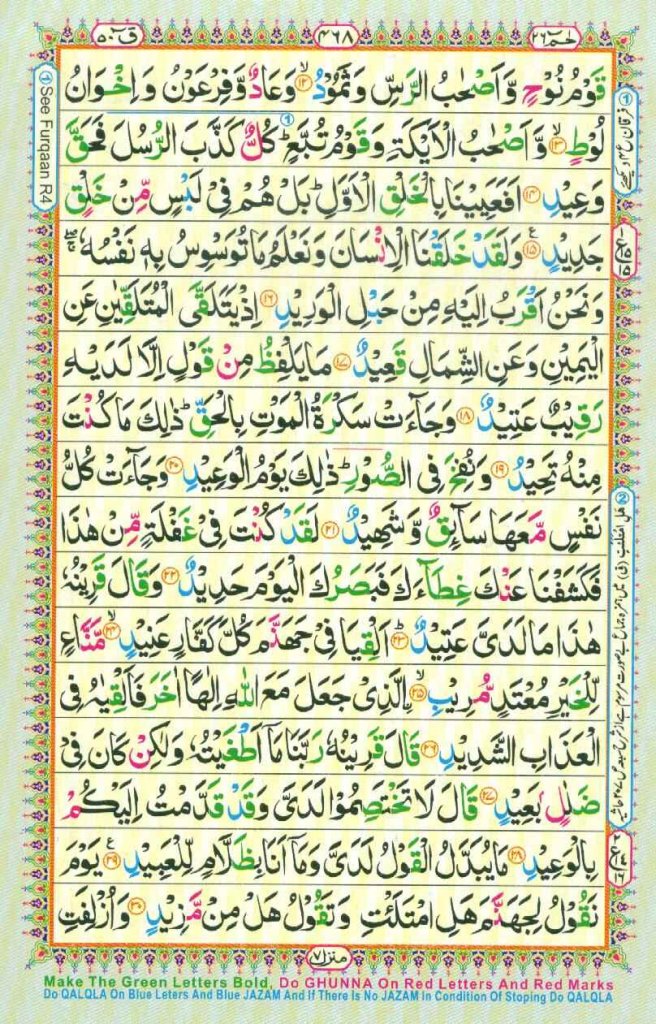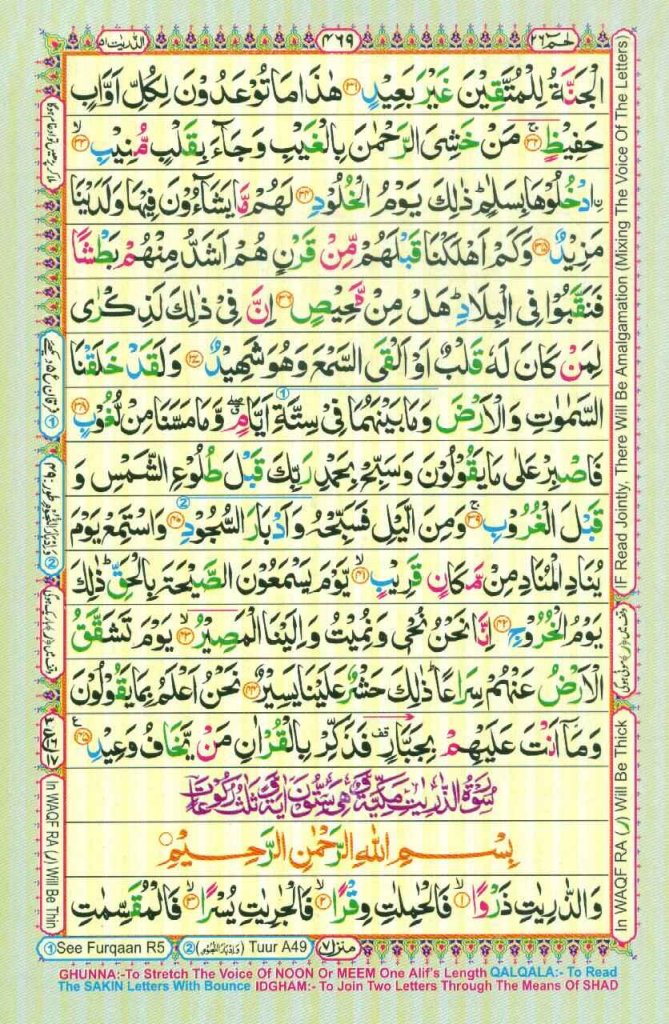Free Download Surat Qaf
Fuul Surah Qaf read online
Qaf (Arabic: ق) is the 50th chapter of the Quran. It consists of 3 Rukus, 45 verses, 373 words, and 1507 letters. The name of sura is derived from the singular Quranic “Mysterious Letter” qaaf that begins the chapter. It starts the Hizb al-Mufassal, the seventh and last section (manzil). The Prophet received this revelation during the early stages of revelation in Mecca. Surah Qaf addresses concepts related to the Resurrection and the Day of Judgment.
Read colour coded Surah Qaf Arabic text with tajweed rules at islamicsurah.com.



Al Quran Surah Qaf summary
- Nonbelievers wonder why a warner came from among them.
- The reality of life after death is not surprising.
- Creation of the world and God’s blessings and favors.
- Mention of the disobedience of the nations of the previous prophets
- God created man and is closer to each person than their jugular vein.
- Allah has appointed two angels to every person to record every word he speak.
- Every disbeliever will be cast into Hell, and Hell will be asked, “Are you full?” Hell will respond, “Is there some more?”
- Sura Qaf ayat 21, mentions the scene on the Day of Judgment where every soul will be presented individually with a witness and a recorder.
- Guide people with the Qur’an and patiently endure with them.
Benefits of Surah Qaf
Followingg are the Sura Qaf benefits and rewards:
- The Prophet (PBUH) used to recite Surah Al Qaf during Eid prayers and Friday sermons (Khutbah) because of its profound significance and the knowledge contained within the sura.
- It is reported from the Noble Prophet (صلى الله عليه وآله وسلم) that:
“Whoever recites Surah e Qaf, Allah will alleviate the hardship and agony of death for him
- Imam al-Baqir (عليه السلام) narrated:
“Whoever recites Al Qaf Surah in their obligatory and voluntary prayers, Allah will increase their sustenance, place their deeds in their right hand, and ease their accountability on the Day of Judgment.”
- Umar ibn al-Khattab inquired of Abu Waqid al-Laithi (may Allah be pleased with them): “What did the Messenger of Allah (صلى الله عليه وآله وسلم) recite during the prayer on the day of sacrifice and on the breaking of the fast?” Abu Waqid replied, “He recited Al Quran Surat Qaf, By the Glorious Quran (50), and Sura The Hour is Nigh (54) at both occasions.”
- According to Tafsir al-Burhan, Surah Qaf recitation is believed to have effects including:
(i) Curing epilepsy
(ii) Increasing sustenance (Rizq)
(iii) Alleviating fears and anxiety.
Surah Qaf ayat 22 for eyesight
- The verse from Surat Qaf,
(٢٢) لَقَدْ كُنتَ فِي غَفْلَةٍ مِّنْ هَٰذَا فَكَشَفْنَا عَنكَ غِطَاءَكَ فَبَصَرُكَ الْيَوْمَ حَدِيدٌ
“Indeed, you were heedless of this, so We have removed from you your cover, and your sight, this Day, is sharp.” (50:22)
is particularly effective for treating eye ailments. One can recite this verse, blow into some water, and then drink it. By the will of Allah (سبحانه و تعالى), any eye problem can be cured. (Source: Fawaid-e-Quran)
- Ashraf Ali Thanvi writes:
To improve eyesight, recite the verse:
(٢٢) فَكَشَفْنَا عَنكَ غِطَاءَكَ فَبَصَرُكَ الْيَوْمَ حَدِيدٌ
“Now have We removed your veil, and sharp is your sight this Day!” (50:22)
three times after each prayer. Blow on your fingers and gently rub them over your eyes. By consistently following this practice, one can maintain strong eyesight and potentially alleviate any existing weaknesses.
Allah is closer than the jugular vein of man
Surah Qaf ayat 16, reflects on Allah’s creation of human beings and His intimate knowledge of them. It highlights how Allah not only brought mankind into existence but also understands the innermost thoughts and whispers of their souls.
وَ لَقَدْ خَلَقْنَا الْاِنْسَانَ وَ نَعْلَمُ مَا تُوَسْوِسُ بِهٖ نَفْسُهٗ ۚۖ-وَ نَحْنُ اَقْرَبُ اِلَیْهِ مِنْ حَبْلِ الْوَرِیْدِ(16)
“And indeed, We created man, and We know what his soul whispers to him, and We are closer to him than [his] jugular vein.”
This verse underscores the profound closeness between Allah and His creation, emphasizing that Allah is closer to each individual than their own jugular vein—a concept that resonates deeply in Islamic theology.
Appointment of two angels to preserve the record of deeds
In Surah Qaf ayat 17, Allah illustrates the meticulous recording of human deeds through two angels positioned to record everything a person does. One sits on the right, recording good deeds, while the other sits on the left, recording bad deeds.
اِذْ یَتَلَقَّى الْمُتَلَقِّیٰنِ عَنِ الْیَمِیْنِ وَ عَنِ الشِّمَالِ قَعِیْدٌ(17)
This symbolic representation in Islamic belief underscores the accountability each person faces for their actions in life. The balanced approach of recording both good and bad deeds serves as a reminder of the importance of moral consciousness and ethical behavior in Islam.
Download Audio of Surah Qaf Sudais and Surah Qaf full pdf.
FAQ’s
Qaf is the 50th chapter of the Qur’an, comprising 45 verses. It derives its name from the singular Quranic “mysterious letter” qaf, which is the opening letter of the chapter.
Quran Surat Qaf discusses the Day of Resurrection and the Hereafter, cautioning disbelievers about their punishment and promising believers their rewards.
In the Holy Quran Sura Qaf juz no is 26th.
Surat Qaf, ayah 19, emphasizes the inevitability and severity of death that one used to fear or try to escape from. It underscores the truth of death and the consequences that follow.